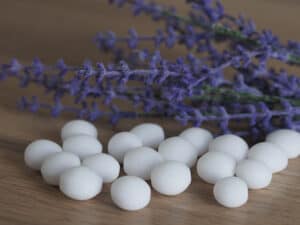Simple Ways to Banish Skunk Odor from Your Clothes

Learning how to get skunk smell out of clothes is not that hard! I understand that it is awful when being “attacked” by a skunk with its terrible smell. This scent can be detected from a thousand miles away! But there are also a lot of easy ways to deal with it!
The skunk odor may fade away in a week, but it is so annoying to wait for that long, isn’t it? Any person or pet messing up with skunks may get a bitter result. Fortunately, you can solve this problem with some common detergents and methods! See what you can do!
The Skunk Spray: Worst Smell Ever
Skunks are mammals with the specialty of spraying a liquid with a horrible smell to defend themselves from predators. This spray is a mixture of sulfur-containing chemicals like thiols, which has an awful smell. (1) It smells so strong that you may detect this odor miles away!
Skunks can spray a victim or predator at an accurate distance of up to 15 feet! Skunk spray doesn’t leave any permanent injury; however, it may cause eye irritation or temporary blindness to the victim to protect the skunks themselves for a while.
The skunk spray is oily and really hard to eliminate. It will cling to your clothes, hair, skin for a long time if you don’t treat it properly! The spray is an oil compound, so you cannot eliminate the stains with just water since water and oil don’t mix.
To prevent the lousy spray of skunks from getting onto you or your pets, you should try not to be in contact with them by looking for skunk dens on the ground in your garden and taking them away. Skunks can’t climb, so they usually make dens on the ground.
You may smell the skunk before you can see them. Some signs showing skunks are around your place are the musk smell around your garden or some shallow, small holes similar to those made by squirrels.
Here’s how the stinky bombs from skunks are made!
How Long Does Skunk Smell Last On Your Clothes?
You can remove the faint skunk smell on clothes easily by hanging in the fresh air and sunlight. However, the strong skunk odor can linger for weeks, months, even several years, especially on clothes, fur, carpet, etc. if it is not handled well immediately.
The dead skunk smell is the worst, which may last from 3 to 4 weeks, and if you don’t deal with it right away, the smell will linger for much longer. If you smell something dead around your house that smells like skunk spray, find the body at all costs and get rid of it.
4 Best Methods To Get Rid Of Skunk Smell On Your Clothes
There are not many ways to get the skunk smell off your clothes or on any surface. Some specific methods with common detergent recipes can handle this problem! Follow my instructions and you may be surprised by what they can do!
First, sort out your sprayed clothes. Make sure that all of them are washable. Check their labels carefully to find out. With non-washable clothes, hang them under the sunlight for a while and take them to a professional who can eliminate the odor with special detergents.

Method 1: Diluted Ammonia Solution
Ammonia is a great detergent that can help eliminate any foul smell on your clothes quickly. Try to make an ammonia solution to deal with the skunk spray smell and stain! Make sure that you never mix ammonia and bleach together since they can make toxic fumes!
Preparation:
- Ammonia
- Water
- Heavy-duty detergent
- A container (large bucket or tub)
Instructions:
Step 1: Prepare An Ammonia Solution.
In a bucket or washtub, with every cup of ammonia, pour in 6 cups of warm water. Stir the mixture well. You just need to mix an enough amount to submerge your clothes.
Step 2: Soak Your Sorted Clothes.
Put all of your washable garments in the solution for at least 30 minutes. Wait for the liquid to permeate inside the fibers.
Step 3: Wash And Dry.
After half an hour, take the clothes out and wash them as you usually do, using heavy-duty detergent including enzymes that can break down the oil particles in skunk spray. Hang the clothes somewhere airy, breezy with lots of sunlight.
Step 4: Rewash If Needed.
If the awful skunk smell is still there, wash your clothes until you can smell nothing from the clothes.
Method 2: Distilled White Vinegar Solution
Vinegar, especially distilled white vinegar, is one of the most common and useful cleaners on the market. It may not be as effective as ammonia, but it can help remove the skunk odor, just with a little longer time.

Preparation:
- Distilled white vinegar
- A container (tub, bucket)
- Heavy-duty detergent
Instructions:
Step 1: Mix the Solution.
Blend distilled white vinegar with water in a 1:4 ratio in a large tub or bucket.
Step 2: Sink Your Sprayed Clothes.
Put your clothing inside the container with the solution and soak them for at least 3 hours.
Step 3: Wash The Garments And Hang Them Up For Drying.
Remove the soaked clothes from the solution and wash them as usual. You can wash them by hand or put them in the washing machine and run for a whole cycle.
You should dry them by hanging them outside your house with nice air ventilation so that the skunk smell can fade away quickly.
Method 3: Hydrogen Peroxide And Baking Soda
Hydrogen peroxide is considered the best enemy of skunk spray smell. It must be diluted before working with the clothes since it is a chemical that can ruin the fibers inside your clothing. So be careful! Baking soda is also an easy-to-use and helpful detergent.
This combination of the two most powerful cleaners can be the best solution you may ever have. There are a lot of ways to combine these two detergents, together or one-by-one.

Warning: Since the hydrogen peroxide may lose its potency really fast, make use of it quickly after mixing with other detergents. Don’t make the mixture in advance or store it in a tightly-closed container.
Preparation:
- 3% hydrogen peroxide
- Baking soda
- Water
- A container (tub, bucket, etc.)
- A wooden spoon.
Instructions:
Option 1: Blend The Detergents Into One Liquid.
Step 1: Create the most powerful solution.
Mix 1 cup of 3% hydrogen peroxide, 1 cup of baking soda, and 6 cups of water in a large container. Stir them with a wooden spoon. Make sure that they blend well together because the chemical (hydrogen peroxide) can cause colorless stains or bleaching on your clothes.
Step 2: Submerge your bad-odor items.
After mixing the liquid, place all the sprayed clothes into the prepared solution for at least one hour.
Step 3: Wash the clothes and hang them in breezy air.
Wash the garments as the label suggests, with hand or in a washing machine. Let your clothes dry naturally by placing them somewhere in breezy and sunny weather. The ultraviolet rays can speed up the odor-neutralizing process.
Option 2: Use The Detergents One By One.
Step 1: Dilute the hydrogen peroxide.
Mix 1 part of 3% hydrogen peroxide with 6 parts of water in a tub or bucket. No adding baking soda in this step.
Step 2: Soak your clothes.
Put the sprayed clothes in the diluted hydrogen peroxide liquid for about an hour before washing.
Step 3: Add baking soda while washing.
After an hour, remove the soaked garments from the container and put them into the washing machine. Before running a cycle, pour half a cup of baking soda directly into the machine. Start to wash as normal.
Step 4: Dry your clothes to get the skunk smell away.
You should never use a dryer to dry your clothes when dealing with bad-smelling clothes. Hanging them under sunlight may be the best drying method. Remember to turn them inside out to avoid discoloration.
However, if your garments are dry clean only or very delicate, you should use vinegar in place of the hydrogen peroxide and baking soda solution. Dilute vinegar in water with a 1:4 ratio vinegar/water and use the solution to remove skunk smell on delicate items.
Method 4: Hydrogen Peroxide, Baking Soda, And Laundry Detergent
This recipe is a little bit stronger than the former one with the help of laundry detergent, the most common cleaner that may appear in every house. You can also replace laundry detergent with a liquid detergent in this solution recipe.

Preparation:
- 3% hydrogen peroxide
- Baking soda
- Laundry detergent
- Water
- A container (tub, bucket, etc.)
- A wooden spoon.
Instructions:
Step 1: Make your solution.
Pour 1 quart (32 ounces) of hydrogen peroxide, 1 cup of baking soda, and 1 teaspoon of laundry detergent (regular or heavy-duty is all fine). Mix them well in a large container with a wooden spoon.
Step 2: Sink your clothes in the prepared solution.
Soak your skunk-smelling clothes in the liquid for at least 2 hours.
Step 3: Wash and rewash if necessary.
Take the clothes out when it’s done soaking and wash them as you wish. Don’t forget to check the labels to make sure that they are washed properly. You may want to wash them once again to get rid of the bad skunk smell completely.
Step 4: Air-dry your clothes.
Dry your clothes in an airy place. Avoid using a dryer or other machine to quickly dry your clothes, since the skunk smell may not evaporate well if they are dried too fast.
Bonus Information:
With this method, you can also replace the laundry detergent with dishwashing liquid and decrease the amount of baking soda to ¼ cup. You should not pre-soak but wash the clothes right after taking them off with this solution, strongest laundry detergent and hottest water.
The above methods may sound difficult, but once you start, you may find that they’re actually easier to do than you thought! Apply them on your clothes and tell me the result by commenting below this post!
Bonus 1: Tips For Deodorizing For You And Your Pets
Your pets, especially dogs and cats, are usually the victims of skunk spray because they like to chase small animals like squirrels and skunks. If skunks spray them, the foul smell may cling to their fur and be hard to remove.
Don’t worry; there’s always a way to save this case! In fact, there are a lot of ways and detergent mixtures for you to try!
Option 1: White Vinegar Solution (For Your Pets Only)
Preparation:
- White vinegar
- Water
Instructions:
Step 1: Make a liquid with the white vinegar and water with a 1:4 ratio – 1 part of vinegar plus 4 parts of water.
Step 2: Rub the mixture onto your pet’s fur coat. Avoid rubbing it into the pet’s eyes because vinegar can happen to burn their eyes.
Step 3: Allow the mixture on the coat for about 5 minutes, then rinse carefully with water. Make sure that you wash every body part of the pet.
Step 4: Dry your pet with a cotton towel.

Option 2: Hydrogen Peroxide, Baking Soda, And Dish Soap (For You And Your Pets)
There are some circumstances where you and your pet are both sprayed by a skunk. If you are walking with your pet and unfortunately exposed to skunk spray, what will you do? Let the stains and smell there untreated? Please don’t! Here are some tips to solve the problem!
Take off the clothes as soon as possible whenever you get home. If you’re wearing a jacket, don’t hesitate to remove it immediately after being sprayed. Then take a bath using the below solution recipe.
Preparation:
- 3% hydrogen peroxide
- Baking soda
- Dishwashing detergent
- A container (tub or bucket)
Instructions:
Step 1: Make the bathing mixture.
Mix a quart (32 ounces) of hydrogen peroxide, a teaspoon of dish soap, and ¼ to ½ cup of baking soda.
Step 2: Shower time!
You should not wet the skin/fur coat with water first so that the “handmade shampoo” can absorb well. Rub yourself or the pet directly with the prepared mixture. Don’t ever rub this mixture on the eyes or any sensitive part.
Step 3: Rinse with water.
Like what you do when bathing, it’s time to wash away the soap. Rinse your skin or your pet’s fur with water, make sure that there’s no soap left.
Warning:
- You should get rid of the soap immediately after using it. Don’t store it in any container since the mixture may destroy it quickly.
- The hydrogen peroxide may decolor the fur of your pet, which makes the coat brighter in color. Therefore, don’t let the soap sit on for more than 5 minutes.
Want to know how to deodorize your dog from the stinky skunk smell? Here’s the way!
Bonus 2: Remove Skunk Spray Odor From Your Furniture
Sometimes, in the worst cases, your furniture can be the victim of the skunk spray smell. So how to solve this headache-causing problem?
With the indoor furniture, your dog may be coated with skunk odor when he gets inside the house and keeps rolling on the couches or sofa. With the outdoor furniture, a skunk may wander around them and spray on them to mark their territory.

Clean The Atmosphere
With the furniture inside your house, before you try to get rid of the smell on them, make sure that the atmosphere in the house is clear first. Here are some useful tips:
- Open all the windows and doors in the house if you can to let the sunlight and fresh air come in to deodorize and oxidize the foul odor from skunks.
- Run all types of available fans in your house (standing and/or ceiling fans) to push away the bad odor.
- Prepare and put some bowls filled with vinegar in the corners of your house for about 1-2 days to absorb the foul skunk smell. Vinegar is famous for its odor-absorbing ability.
- If you are using the HVAC temperature system for your house, turn on the fan and keep it running until the smell is eliminated.
When the skunk spray smell is not in your house anymore, clean or change the filters of the furnace, air conditioners, or any available air-filtering machine so that the smell can’t linger around for any longer.
Clean The Furniture
Furniture varies with many different options; therefore, with every type of furniture, I’ll show you the specific ways to remove the smell from it! Try to deal with the foul odor as soon as possible, before it gets dry!
For indoor furniture, blend the detergents to make a solution with 1 qt. vinegar/hydrogen peroxide, 1 teaspoon of dish soap, and ¼ cup of baking soda in a bowl. Use a rag to rub on the skunk-smelling furniture piece carefully. You can also spray it.
For outdoor furniture and hard surfaces, mix 1 cup of Clorox bleach or white vinegar and 9 cups of water together in a container. Spray it on the furniture, and then blot it with a rag. Remember to do a patch test with this solution on the furniture piece or the surface first.
For wooden furniture, make an ammonia solution with a 1:4 ratio ammonia/water. Dip a rag in the liquid, wring it out, and gently scrub on the furniture.
For wall-to-wall carpeting and/or curtains made of heavy fabric, it is complicated to clean them by yourselves, so consider calling in a professional for steam cleaning. Or you can rent a steam cleaner to get rid of the bad odor on your own.
At the end of the process, you can spray a fabric deodorizer on the furniture to give it a nice fresh scent for the cleaned piece of furniture.
Once again, remember to handle the skunk spray smell and stains on anything as soon as you have time. The longer you leave it there, the more complicated it gets to eliminate the odor.
If the skunks keep getting in your house and garden, this small tip may help!
FAQs
The skunk smell may be hard to get rid of completely because of its oily stains, but I hope that the above methods are enough for you to try. Some questions may pop up in your head and need an answer. Check out this Q&A section!
Have You Known How To Eliminate The Skunk Smell Yet?
This article provides you with the proper methods to get rid of the skunk smell on clothes and your pets and other stuff around you. By reading this post thoroughly, I’m sure that you can find yourself a way to deal with it!
If you find it interesting, you can like and share the post with your friends to learn these tips and immediately solve the problems when they accidentally get into this kind of trouble. See you next time!

References
- En.wikipedia.org. 2021. Skunk – Wikipedia.
- Healthline. 2021. How to Get Rid of Skunk Smell: Off People, Pets, Clothes, and More.







Samantha Lee
Head Cleaning Expert
Expertise
Professional Home Cleaning, Green Cleaning Techniques, Stain Removal & Fabric Care, DIY Home Maintenance & Organization, Sustainable Cleaning Products, Home Care for Busy Lifestyles
Education
University of Denver
Samantha Lee is the Head Cleaning Expert at HomeCleaningForYou.com, specializing in eco-friendly home care. She holds a Bachelor of Science in Environmental Science from the University of Denver, focusing on sustainable cleaning solutions.
With expertise in green cleaning, stain removal, and DIY home maintenance, she helps homeowners keep their spaces fresh and chemical-free. Samantha has been featured in lifestyle publications and has partnered with brands promoting natural cleaning products.
She also shares practical tips through her blog, online courses, and workshops. Passionate about sustainability, she enjoys testing new eco-friendly cleaning methods and spending time outdoors.